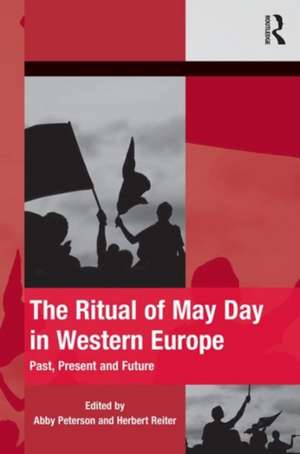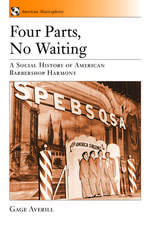The Ritual of May Day in Western Europe: Past, Present and Future: The Mobilization Series on Social Movements, Protest, and Culture
Autor Abby Peterson, Herbert Reiteren Limba Engleză Hardback – 8 iun 2016
| Toate formatele și edițiile | Preț | Express |
|---|---|---|
| Paperback (1) | 215.73 lei 43-57 zile | |
| Taylor & Francis – 30 iun 2020 | 215.73 lei 43-57 zile | |
| Hardback (1) | 528.44 lei 43-57 zile | |
| Taylor & Francis – 8 iun 2016 | 528.44 lei 43-57 zile |
Din seria The Mobilization Series on Social Movements, Protest, and Culture
-
 Preț: 279.89 lei
Preț: 279.89 lei -
 Preț: 317.48 lei
Preț: 317.48 lei -
 Preț: 311.41 lei
Preț: 311.41 lei -
 Preț: 311.41 lei
Preț: 311.41 lei - 19%
 Preț: 270.20 lei
Preț: 270.20 lei - 17%
 Preț: 259.98 lei
Preț: 259.98 lei - 17%
 Preț: 259.98 lei
Preț: 259.98 lei -
 Preț: 382.95 lei
Preț: 382.95 lei - 17%
 Preț: 259.98 lei
Preț: 259.98 lei -
 Preț: 416.22 lei
Preț: 416.22 lei -
 Preț: 382.91 lei
Preț: 382.91 lei - 18%
 Preț: 1000.27 lei
Preț: 1000.27 lei - 17%
 Preț: 259.98 lei
Preț: 259.98 lei - 30%
 Preț: 846.11 lei
Preț: 846.11 lei - 13%
 Preț: 297.99 lei
Preț: 297.99 lei -
 Preț: 389.66 lei
Preț: 389.66 lei -
 Preț: 382.57 lei
Preț: 382.57 lei - 17%
 Preț: 178.76 lei
Preț: 178.76 lei -
 Preț: 386.35 lei
Preț: 386.35 lei - 25%
 Preț: 767.20 lei
Preț: 767.20 lei - 18%
 Preț: 1000.27 lei
Preț: 1000.27 lei -
 Preț: 416.22 lei
Preț: 416.22 lei - 18%
 Preț: 272.97 lei
Preț: 272.97 lei -
 Preț: 215.73 lei
Preț: 215.73 lei -
 Preț: 482.56 lei
Preț: 482.56 lei -
 Preț: 436.14 lei
Preț: 436.14 lei -
 Preț: 469.34 lei
Preț: 469.34 lei -
 Preț: 385.54 lei
Preț: 385.54 lei - 18%
 Preț: 1054.71 lei
Preț: 1054.71 lei
Preț: 528.44 lei
Preț vechi: 705.45 lei
-25% Nou
Puncte Express: 793
Preț estimativ în valută:
101.11€ • 105.86$ • 83.67£
101.11€ • 105.86$ • 83.67£
Carte tipărită la comandă
Livrare economică 07-21 aprilie
Preluare comenzi: 021 569.72.76
Specificații
ISBN-13: 9781472415271
ISBN-10: 1472415272
Pagini: 306
Dimensiuni: 156 x 234 x 24 mm
Greutate: 0.66 kg
Ediția:1
Editura: Taylor & Francis
Colecția Routledge
Seria The Mobilization Series on Social Movements, Protest, and Culture
Locul publicării:Oxford, United Kingdom
ISBN-10: 1472415272
Pagini: 306
Dimensiuni: 156 x 234 x 24 mm
Greutate: 0.66 kg
Ediția:1
Editura: Taylor & Francis
Colecția Routledge
Seria The Mobilization Series on Social Movements, Protest, and Culture
Locul publicării:Oxford, United Kingdom
Cuprins
Foreword: the myth of May Day, (Rick Fantasia)
Introduction: Western European May Day rituals: past, present and future, (Abby Peterson and Herbert Reiter;
1. The origins of May Day: history and memory, (Herbert Reiter)
2. The First of May in Germany and Italy, (Herbert Reiter)
3. The May Day tradition in Finland and Sweden, (Christer Thörnqvist, Tapio Bergholm and Margaretha Mellberg)
4. May Day in Spain - socialist and anarchist traditions, (Eduardo Romanos and José Luis Ledesma)
5. May Day in Britain, (Chris Wrigley)
6. The context of contemporary May Day demonstrations in six European countries, (Abby Peterson)
7. Who takes part in May Day marches?, (Magnus Wennerhag)
8. Why do people demonstrate on May Day?, (Mattias Wahlström)
9. The future of May Day, (Abby Peterson and Herbert Reiter)
Appendix: methods for studying May Day demonstrators: sampling, estimating non-response bias and pooling data with general population surveys, (Mattias Wahlström and Magnus Wennerhag)
Index
Introduction: Western European May Day rituals: past, present and future, (Abby Peterson and Herbert Reiter;
1. The origins of May Day: history and memory, (Herbert Reiter)
2. The First of May in Germany and Italy, (Herbert Reiter)
3. The May Day tradition in Finland and Sweden, (Christer Thörnqvist, Tapio Bergholm and Margaretha Mellberg)
4. May Day in Spain - socialist and anarchist traditions, (Eduardo Romanos and José Luis Ledesma)
5. May Day in Britain, (Chris Wrigley)
6. The context of contemporary May Day demonstrations in six European countries, (Abby Peterson)
7. Who takes part in May Day marches?, (Magnus Wennerhag)
8. Why do people demonstrate on May Day?, (Mattias Wahlström)
9. The future of May Day, (Abby Peterson and Herbert Reiter)
Appendix: methods for studying May Day demonstrators: sampling, estimating non-response bias and pooling data with general population surveys, (Mattias Wahlström and Magnus Wennerhag)
Index
Notă biografică
Abby Peterson, University of Gothenburg, Sweden.
Herbert Reiter, European University Institute, Florence, Italy.
Herbert Reiter, European University Institute, Florence, Italy.
Descriere
This volume explores how May Day demonstrations have evolved and taken different trajectories in different political contexts, examining May Day rituals today by way of a comparison of data from over 2000 questionnaires from six countries: Belgium, Italy, Spain, Sweden, Switzerland and the UK. As such it offers a thorough understanding of how participants are bestowing meaning on May Day rituals as a form of labour demonstration.














